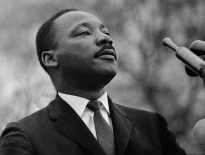“For men’s religion to God is between God and themselves. The king shall not answer for it. Neither may the king be judge between God and man. Let them be heretics, Turks, Jews, or whatsoever, it appertains not to the earthly power to punish them in the least measure. This is made evident to our lord the king by the scriptures.” These are the words that sum up the revolutionary thinking of the Englishman Thomas Helwys, a pioneer of the Baptist Church from the early 17th century.
Helwys’s most spectacular statement—which at the time illustrated an astonishing understanding of the foundation of the principle of religious freedom—includes the right of every man to believe what they choose (the Christian faith, with its ramifications, the Islamic or the Mosaic one) or even not to believe at all.
The statement was made in the context of debates (and wars) in Europe triggered by the question: What kind of Christianity should be imposed on the population? Luther’s protest in 1517, backed by German princes, prompted entire regions of Protestant Germany to declare independence from the Roman Catholic Church, as Rome no longer had the support of civilian powers in imposing beliefs and practices or in sentencing to death those considered heretics.
In England, Henry VIII had broken away from the Church of Rome, for personal and political reasons, but he himself had become the head of the new Church of England in 1534. Back then there was no separation between the civil and the religious power. Therefore, both in the time of Henry VIII and of the kings who succeeded him, religious minorities were persecuted in England.
A troubled life…
Against this backdrop Thomas Helwys was born. Having studied law, he adopted the ideas of the Puritans—a reform movement within the Anglican Church that called for the abolition of Catholic ceremonies and practices which were not based on the Bible.
When, in 1606, Archbishop Bancroft asked all priests and church ministers to submit to the Book of Common Prayer—which virtually imposed the Anglican liturgy with its theological content on all Christians—Thomas joined the radical Puritans, who were separated from the Church of England. He thus came into conflict with the law of the land, which did not grant rights and freedoms to those who adhered to minority religious beliefs. Thomas’s wife, Joan, would soon be among those imprisoned for this reason, too.
In 1607–1608, John Smyth and Thomas Helwys were among the radical Puritans who fled to Amsterdam to escape the king’s persecution. The theology of the two was refined in time, taking further the belief that people must adhere to Christianity as a consequence of their personal religious beliefs, moving away from Calvinist predestination and recognizing the individual’s freedom of choice.
It was in this way that they came to accept adult baptism. In 1611, Thomas Helwys wrote the earliest Baptist confession of faith and his famous work A Short Declaration of this Mystery of Iniquity, “the first ever English book defending the principle of religious liberty”.[1]
In 1613, Thomas Helwys returned to his homeland, along with twelve other Baptist refugees, and despite obvious risks, he established the first Baptist congregation in England. A copy of his book was sent to King James I of England with a handwritten dedication from Helwys. The consequence was predictable: Thomas Helwys and other Baptists were imprisoned at Newgate, where Thomas remained until his death in 1616 at the age of 40.
…an enlightened mind
Helwys’s book is a four-section commentary on the book of Revelation, in which Helwys applies apocalyptic symbols to the realities he lived. In describing the political-religious context he observed, Helwys formulated the principles of religious freedom, largely exactly as we know them today.
In the first section of his work, Helwys states that the errors of the Catholic Church are “the abomination that causes desolation” (Matthew 24:15), that this is the first beast of Revelation (Revelation 13:1), and that the papal office is the Antichrist, the man of lawlessness. Because the Church of England copied the practices of the Catholic Church, Thomas described it as the second beast of Revelation (Revelation 13:11), which, although it has the horns of a lamb and therefore claims to preach the religion of Christ, behaves like a dragon, imposing its authority over people’s consciences through civilian power.
Clerical systems can get degraded, can be corrupted, and their practices can become sinful. When a church practice or doctrine can be called a sin according to the Bible, believers must separate themselves from sin. A state religion, however, makes this impossible. For Helwys, religious freedom is a requirement of the gospel.
In the second section of the book, Helwys anticipates that the “kings of the earth” will hate the apostate churches, represented by the prostitute of Revelation (Revelation 17:16), and calls on the civil authorities to withdraw their affection for the beast and to replace it with contempt.
The king may summon his subjects to war or appoint government officials; that is, he has jurisdiction in civil matters. But the king cannot rule over the conscience of his subjects, for this is outside his jurisdiction: the king has been given only an earthly sword, not a spiritual one.[2]
Against this background appears the following revolutionary paragraph: “Let them be heretics, Turks, Jews, or whatsoever, it appertains not to the earthly power to punish them in the least measure.”[3]
In the third section of his book, Thomas Helwys criticises the Puritans for trying to reform a church that can no longer be purified, while in the fourth section his criticism is directed at the moderate separatists, who, although out of the Anglican Church, did not abandon the sign and seal of Babylon—the baptism of infants, which is not commanded by the gospel and is therefore a worldly baptism.
At the time, Helwys’s book was undoubtedly “the most far-reaching declaration of universal religious freedom yet seen in English”, though the “most mean-spirited”[4] (addressed to Thomas Helwys’s opponents).
Helwys’s proposals, which he sealed through his death, were visionary, going beyond the historical time in which he was living. Essentially, Helwys bequeathed to us two great ideas: (1) that the supreme imperative of the gospel for Christians is to turn away from sin—therefore not to submit to any authority that compels them to commit sin—and (2) that Christian principles cannot be imposed by means of the sword/power of the state, but by evangelism, by the spiritual sword of the Word of Christ.




















